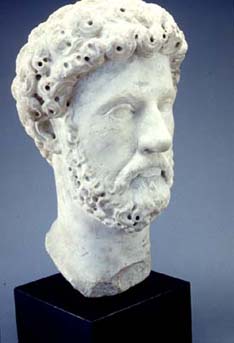

Early life: Marcus Aurlius was born Marcus Annius Verus on April 26, 121 A.D. His father's side of the family was Spanish, but his father had been granted the right of a patrician by the Emperor Vespasian. Although Marcus lost his father as an infant, he was brought up by his grandfather who provided him the best Greek and Latin teachers of literature, rhetoric, philosophy, law, and painting in Athens. In the first chapter of his book, The Meditations, Marcus graciously thanks his family , and especially his grandfather, for his superior upbringing.
At an early age Marcus won the favor of Hadrian, who coined him Verissimus, from his family name Verus, meaning the most true. He was granted equestrian honors at age six, and by age eight was made a priest of the Salian brotherhood. After the death of Aelius Caesar, Hadrian adopted Marcus' uncle, Antonius Pius, who in turn adopted Marcus and the son of Aelius Caesar, Lucius Ceionius Commodus. Marcus married Annia Galeria Faustina, the daughter of Antonius Pius, though previous to his adoptionhe had been betrothed to the daught of Aelius Caesar.
Became Emperor: After Hadrian died, Marcus and Lucius were both named Emperor in 161. This was the first time that Rome had ever had two Emperors. They ruled jointly, though Lucius was less competent and was clearly more interested in his own pleasure than his duties to Rome. After Lucius' death in 169, Marcus was named the sole ruler.
Marcus' reign was plagued by many wars. This was a heavy drain on the treasury. Barbarians such as the Germans presented a serious problem, especially along the Danube River. It was during these times that Marcus wrote his work, The Meditations. This was sort of a "spiritual diary" in which he wrote down many of his beliefs which centered around Stoic philosophy. The book itself was written during the time when he was campaigning against the Germans and was not originally meant to be published. The Meditations were written day by day in every situation; even big things such as war to the trials of everyday life were included.
What is Stoicism? Stoics feel that the present is concrete, not abstract, though it is heavily influenced by a greater spirit, i.e., god. Stoics feel that a person must not be selfish or biased and must perform one's life work in the right manner. Stoics believe a person should not show emotions, but be able to bear all things. They were taught to accept cheerfully whatever came, e.g., poverty, disease, or even death. Then a person can truly be harmonious with the world and so achieve true freedom.
Persecuted Christians: Though Marcus Aurelius was a humanitarian leader and lowered many taxes and at times was charitable to the poor, he was a key figure in the persecution of Christians. He was very unsympathetic to them and thought that Christians should not be sought after, but they should be punished if they refused to make sacrifices to the gods when asked.
Death: Marcus Aurelius died of natural causes while out fighting at the Danube River on March 17, 180 A.D. His son Commodus took over after his death, inheriting the war at the Danube and a drained treasury. Marcus' book The Meditations is considered a very good example of the Stoic philosophy, and after his death his statue held a very prominent place among the Romans.
Written by Stephanie and Brandie